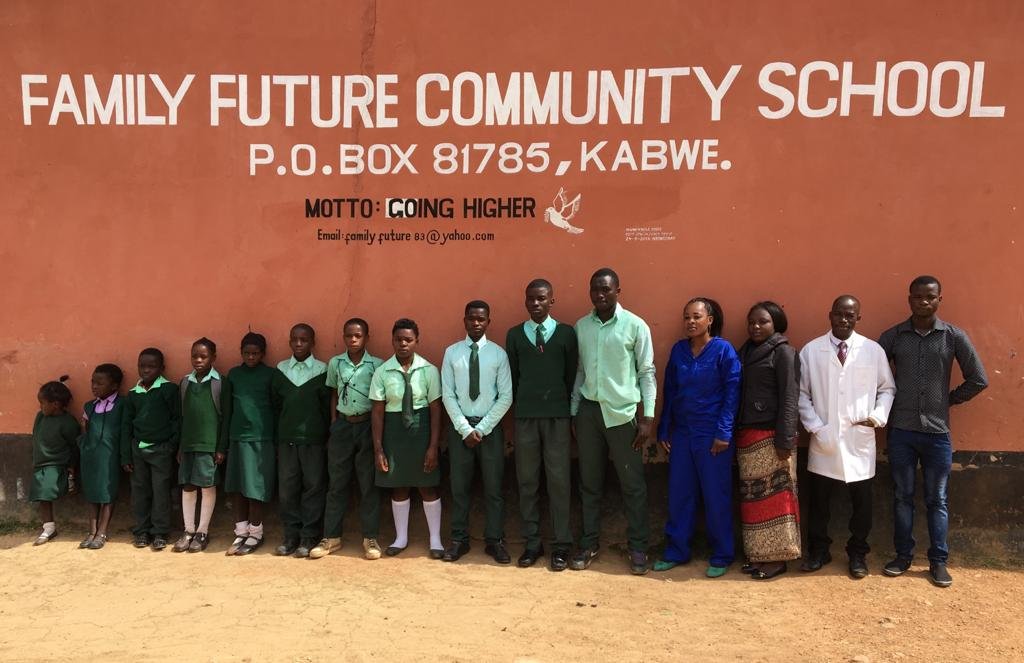The Learning Campus
Family Future Community School
The school’s programmes take place on the campus of the Church Family Mission, which was established in Mwalala, Kabwe in 2004. The school recruits children from mainly three shanty compounds on the western outskirts of Kabwe: Nakoli, Shamabanse, and Bwacha. With endemic high unemployment, poor nutrition, and a number of health issues, including the AIDS pandemic, these compounds face daily a complex mix of social problems, which inevitably impact negatively on the lives of the children. Although education in Zambia is fee-free in government schools, the need to provide uniform, regulation shoes, books and school fund money means that a significant number of children from these compounds are unable to afford to go.
Family Future Community School takes 1000 of these vulnerable children – all carefully screened through the school’s Admissions Policy criteria – from pre-school to Grade 12 (upper secondary level). The children are fed and educated with no fees levied for any items. Over the last 3 years, class size has been reduced to a maximum of 40 learners, with 2 classes being recruited per grade, up to Grade 12 currently.
In 2017, the school took on Grant-Aided status, which meant that the Zambian Ministry of General Education would employ and remunerate the teaching staff, with all other funding requirements being met by another source – in our case Future Pillars Zambia. However, the reality of the past 5 years has been a small proportion of the teachers being on Government payroll and the vast majority receiving a modest allowance from FPZ. Despite this situation, our dedicated and qualified staff are committed to meeting the needs of the children at Family Future Community School and we owe them a huge debt of gratitude.
Please look out for Equipment appeals
Our supporters are vital to this
When practical things are needed such as furniture and equipment for the school or good quality shoes for the children - we assemble donations in the UK and ship them out in industrial containers.
Shoes collected in the UK - ready to ship out
Loading up the furniture in the UK
One of the containers containing furniture and equipment arriving in Kabwe
Unpacking in Kabwe
Starting in 2016, donations of classroom and office furniture, classroom resources, textbooks, computers, fiction books, televisions, specialist equipment for science and other bulk items came from schools and colleges.
Once emptied, the four 40ft containers will be positioned side by side and, after refurbishment, may become a Learning Resource Centre and Library.
Keep an eye on our upcoming events to contribute to equipment appeals
The school in action
We start at Pre school and go through to Upper Secondary
Learning all the time - this lesson, about nutrition
The school teaches to the Zambian National Curriculum
Policies & Guidelines
View the policies in place at Family Future Community School
Family Care and Orphan Board
After considerable discussion, a group of six people volunteered to take on a governance role at the School, the Family Care and Orphan Board (FCOB). Local governance of schools is not commonplace in Zambia, unlike the UK, but FCOB is being registered with the Register of Societies in Zambia as a not-for-profit organisation, giving its status formal credibility.
Between October and December 2021, governor training was facilitated for FCOB via Zoom covering:
1 What does it mean to be a School Governor at FFCS?
2 The School Curriculum
3 School Personnel
4 School Finances
5 School Premises
6 The School of the Future
There has already been encouraging progress on the vital topic of Safeguarding in the school, with the appointment of Menda Nkweto, the lead teacher, Martha Ngoma, the lead FCOB governor, and Rosemary Stanbury, the lead FPZ trustee, to help the effective implementation of the agreed policy and concomitant procedures.
FCOB is also investigating potential sources of funding for the school within Zambia, and the next stage in this exciting development is for FCOB to pursue charitable trust status within Zambia. Whilst there is no time scale for this ‘next step’, the positive commitment is demonstrable. We are encouraging our friends in Kabwe to reduce their dependence on us, both in terms of governance and funding the project. Empowerment is not just for the children but the whole community in and around the school.
About the area
The school is situated close to several of the poorest compounds in Kabwe (Bwacha, Nakoli and Shamabanse) where, due to the AIDS pandemic, grandparents and widows are looking after families of orphaned children and there is high unemployment and social problems.
We are divided by much more than distance of course – by health, by wealth, by opportunities – but we are true partners and united in our desire to help the orphans and vulnerable children of Kabwe.











